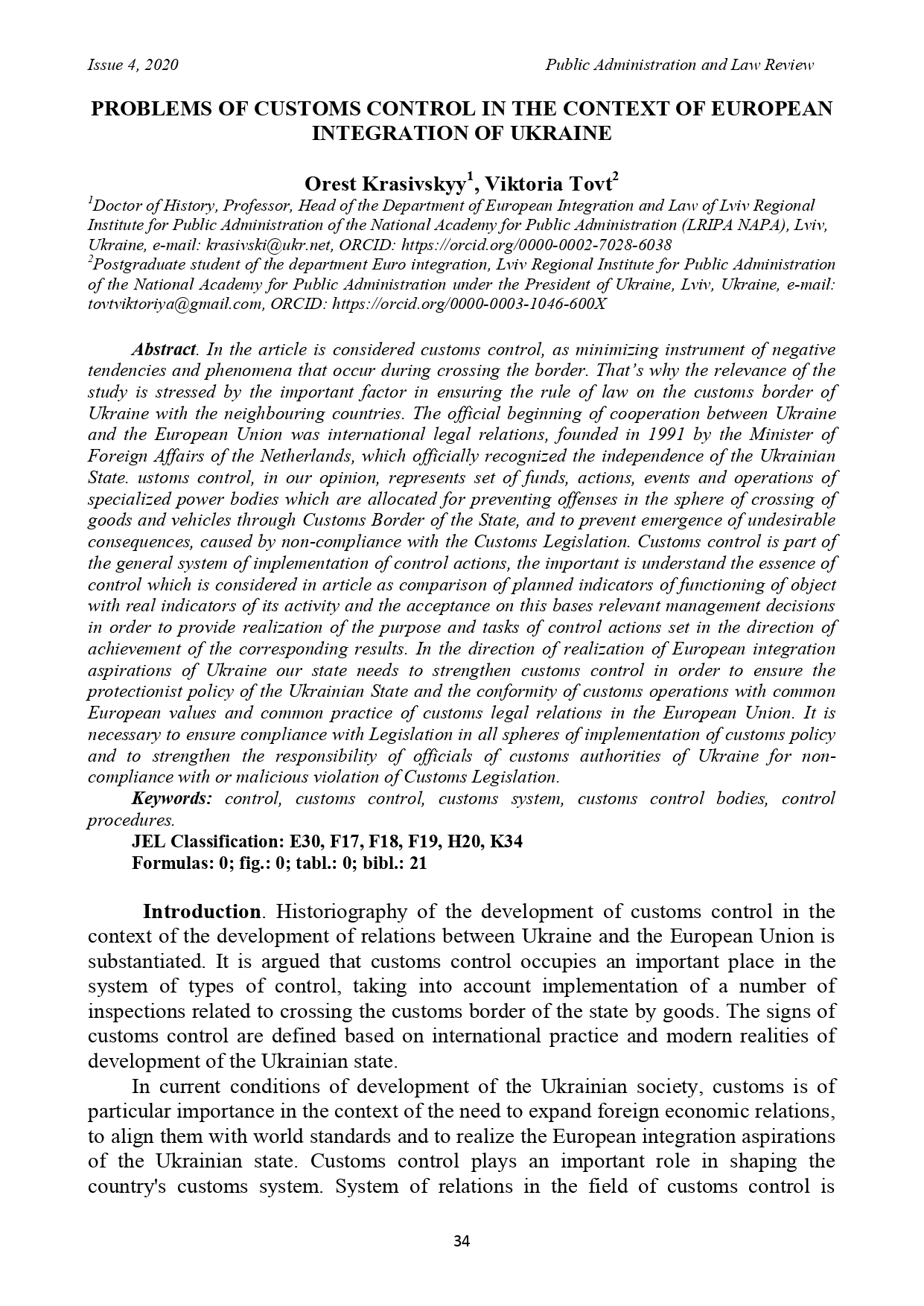PROBLEMS OF CUSTOMS CONTROL IN THE CONTEXT OF EUROPEAN INTEGRATION OF UKRAINE
DOI:
https://doi.org/10.36690/2674-5216-2020-4-34Keywords:
control, customs control, customs system, customs control bodies, control proceduresAbstract
In the article is considered customs control, as minimizing instrument of negative tendencies and phenomena that occur during crossing the border. That’s why the relevance of the study is stressed by the important factor in ensuring the rule of law on the customs border of Ukraine with the neighbouring countries. The official beginning of cooperation between Ukraine and the European Union was international legal relations, founded in 1991 by the Minister of Foreign Affairs of the Netherlands, which officially recognized the independence of the Ukrainian State. ustoms control, in our opinion, represents set of funds, actions, events and operations of specialized power bodies which are allocated for preventing offenses in the sphere of crossing of goods and vehicles through Сustoms Border of the State, and to prevent emergence of undesirable consequences, caused by non-compliance with the Customs Legislation. Customs control is part of the general system of implementation of control actions, the important is understand the essence of control which is considered in article as comparison of planned indicators of functioning of object with real indicators of its activity and the acceptance on this bases relevant management decisions in order to provide realization of the purpose and tasks of control actions set in the direction of achievement of the corresponding results. In the direction of realization of European integration aspirations of Ukraine our state needs to strengthen customs control in order to ensure the protectionist policy of the Ukrainian State and the conformity of customs operations with common European values and common practice of customs legal relations in the European Union. It is necessary to ensure compliance with Legislation in all spheres of implementation of customs policy and to strengthen the responsibility of officials of customs authorities of Ukraine for non-compliance with or malicious violation of Customs Legislation.
Downloads
References
The Verkhovns Rada of Ukraine (1993), The Law of Ukraine “About Foreign Economic Activity”, .April 16 1991 №959. Ukrainian Customs. Reference Book, Moscow: Libra, 1993, 120 p.
Bakumenko, V. D. (2003), Philosophical and methodological basis of state and management decisions. State management: philosophical, worldview and methodological problems. Kyiv : Millennium, p. 147-169.
Bardash, S. V. (2013), Methods of control in the sphere of economic management: theoretical and praxeological aspects, retrieved from : soskin.info/userfiles/file/2013/9-10./Bardash-Osadcha.doc.
Becker, G. S. (2003), Human behavior. Economic March. Publishing House of the State University “Higher school of Economics”, 174 p.
Berezhniuk, I. G. (2009), “Customs Regulating of Ukraine: national and international aspects”, Academy of Customs Service of Ukraine, 543 p.
Bilukha, M. T. (2014), “Customs control: organization and methodology”, Scientific Bulletin of the National University of the STS of Ukraine, p. 181–187.
Butynets, F. F. (2001), Audit and revision of business activity. PE “Ruta”, 416 p.
Butynets, F. F. (2016), “Integrated accounting as way of enterprise management”, Accounting, analysis and audit: problems of theory, methodology, organization, № 2, p. 12-24.
The Verkhovns Rada of Ukraine (2012), The Law of Ukraine “Customs Code of Ukraine”, № 44-45, Art.552.
The Verkhovns Rada of Ukraine (2012), The Law of Ukraine “Customs Code of Ukraine”, March 2012, retrieved from : http://zakon1.rada.gov.ua/laws/show/4495- 17/page18.
Diomin, Yu. M. (2009), Customs Law of Ukraine. Centre of Educational Literature, 232 p.
Drozd, I. K. (2007), State Financial Control. Imex-Ltd, 304 p.
Hodovanets, O. V. (2016), “Customs control : essence and economic contest”, Scientific Bulletin of Kharkiv State University. Series Economic Sciences. Issue 20. Part 1. Pp. 159-163.
International Convention on the Simplification and Harmonization of Customs Procedures (Kyoto Convention) of 18 May 1973, retrieved from : http://zakon5.rada.gov.ua/laws/show/ en/995_643/page.
Kocherin, E. A. (2017), Basics of the state and management control. Informational and Publishing House “Filin”, 384 p.
Martyniuk, V. P. (2010), “On the expediency of using the term “Customs System of the State”, Customs Security, № 2, p. 144-145.
Melnik, M. V. (2007), Audit and Control : Educational Manual. KnoRus, 520 p.
Regulation (EC) No 4502008 of the European Parliament and of the Council of 23 April 2008 laying down the Community Custom Code (Modernized Customs Code). Official Journal of European Communities, L 145, pp. 1-67.
Romaniv, M. V. (2000), “Formation and development of the state financial control in Ukraine”, Abstract of Ph.D. dissertation, Economics, 189 p.
Lukyanchuk, P. (2020). Trade union control in the context of trade union relations with public administration entities in Ukraine. Public Administration and Law Review, (3), 41-48. https://doi.org/10.36690/2674-5216-2020-3-41.
Tešanović, B., Neševski, A., & Krmpot, V. (2020). Certain aspects of economic relations between Serbia and Germany. Economics, Finance and Management Review, (1), 26-36. https://doi.org/10.36690/2674-5208-2020-1-26-36.

Additional Files
Published
How to Cite
Issue
Section
License
Copyright (c) 2020 Scientific Center of Innovative Researches OÜ

This work is licensed under a Creative Commons Attribution 4.0 International License.





